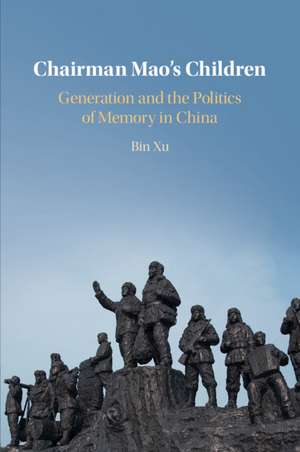Chairman Mao's Children: Generation and the Politics of Memory in China
Autor Bin Xuen Limba Engleză Paperback – 14 dec 2022
| Toate formatele și edițiile | Preț | Express |
|---|---|---|
| Paperback (1) | 177.35 lei 3-5 săpt. | +14.82 lei 7-13 zile |
| Cambridge University Press – 14 dec 2022 | 177.35 lei 3-5 săpt. | +14.82 lei 7-13 zile |
| Hardback (1) | 639.58 lei 6-8 săpt. | |
| Cambridge University Press – 16 iun 2021 | 639.58 lei 6-8 săpt. |
Preț: 177.35 lei
Nou
Puncte Express: 266
Preț estimativ în valută:
33.94€ • 35.36$ • 28.10£
33.94€ • 35.36$ • 28.10£
Carte disponibilă
Livrare economică 13-27 martie
Livrare express 27 februarie-05 martie pentru 24.81 lei
Preluare comenzi: 021 569.72.76
Specificații
ISBN-13: 9781108928786
ISBN-10: 1108928781
Pagini: 286
Dimensiuni: 152 x 229 x 15 mm
Greutate: 0.39 kg
Editura: Cambridge University Press
Colecția Cambridge University Press
Locul publicării:Cambridge, United Kingdom
ISBN-10: 1108928781
Pagini: 286
Dimensiuni: 152 x 229 x 15 mm
Greutate: 0.39 kg
Editura: Cambridge University Press
Colecția Cambridge University Press
Locul publicării:Cambridge, United Kingdom
Cuprins
Introduction; 1. Winners' stories; 2. Unequal memories; 3. The wasted years and a land of wonder: The literary memory; 4. Regretless Youth and Long Live Youth!: Exhibits and museums as sites of memory; 5. Nostalgia, resistance, and the pursuit of happiness: Generation and memory in groups; 6. 'Comrades from five lakes and four seas!': When groups chuanlian (link up); Conclusion; Appendix: Methods and data.
Recenzii
'Questioning the mythologizing of the Educated Youth experience as embodied by elites such as Xi Jinping, Bin Xu gives us well-rounded portraits of losers as well as winners of this Cultural Revolution policy, while making a major contribution to the sociological study of the construction and consequences of memory.' Thomas Gold, University of California, Berkeley
'Since it was first formulated in the 1920s by sociologist Karl Mannheim, the problem of generations has been notoriously difficult to study empirically. Yet Bin Xu has managed to capture China's recent generational story here without simplifying it unduly. Chairman Mao's Children is thus a model of sociological clarity and an important contribution to the literature on political culture, collective memory, and social change in China and beyond.' Jeffrey K. Olick, University of Virginia
'Chairman Mao's Children authoritatively and sympathetically analyzes current identity dilemmas and memory challenges of China's zhiqing generation, a generation of urban youth sent to rural villages in the 1960s and 70s. Beautifully written, theoretically sophisticated, and methodologically rigorous, Bin Xu reveals the multiple ways these individuals and their society do, and don't, come to terms with the consequences of such rupturing historical events.' Robin Wagner-Pacifici, The New School for Social Research
'… Xu's study is a fresh experiment and an undoubted contribution to the already relatively mature research field of educated youth, as it not only fills academic gaps but also meets the needs of the general public.' Jiawen Sun, The China Quarterly
'Since it was first formulated in the 1920s by sociologist Karl Mannheim, the problem of generations has been notoriously difficult to study empirically. Yet Bin Xu has managed to capture China's recent generational story here without simplifying it unduly. Chairman Mao's Children is thus a model of sociological clarity and an important contribution to the literature on political culture, collective memory, and social change in China and beyond.' Jeffrey K. Olick, University of Virginia
'Chairman Mao's Children authoritatively and sympathetically analyzes current identity dilemmas and memory challenges of China's zhiqing generation, a generation of urban youth sent to rural villages in the 1960s and 70s. Beautifully written, theoretically sophisticated, and methodologically rigorous, Bin Xu reveals the multiple ways these individuals and their society do, and don't, come to terms with the consequences of such rupturing historical events.' Robin Wagner-Pacifici, The New School for Social Research
'… Xu's study is a fresh experiment and an undoubted contribution to the already relatively mature research field of educated youth, as it not only fills academic gaps but also meets the needs of the general public.' Jiawen Sun, The China Quarterly
Notă biografică
Descriere
Exploration of how China's 'sent-down' generation have come to terms with their difficult past, caught between the political and personal.
